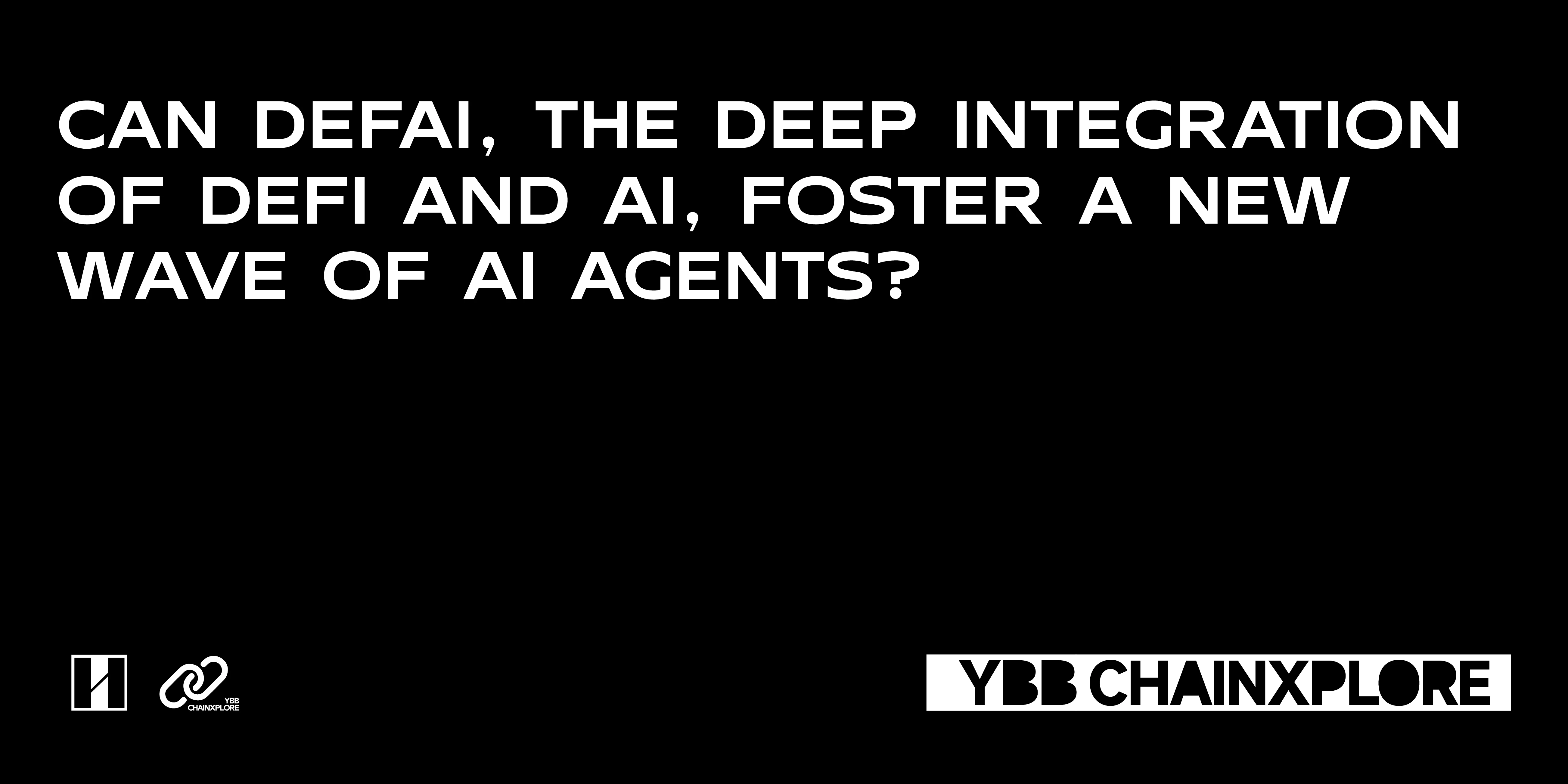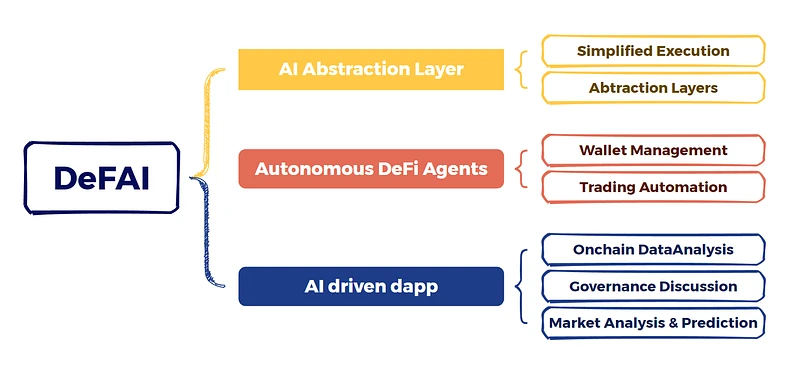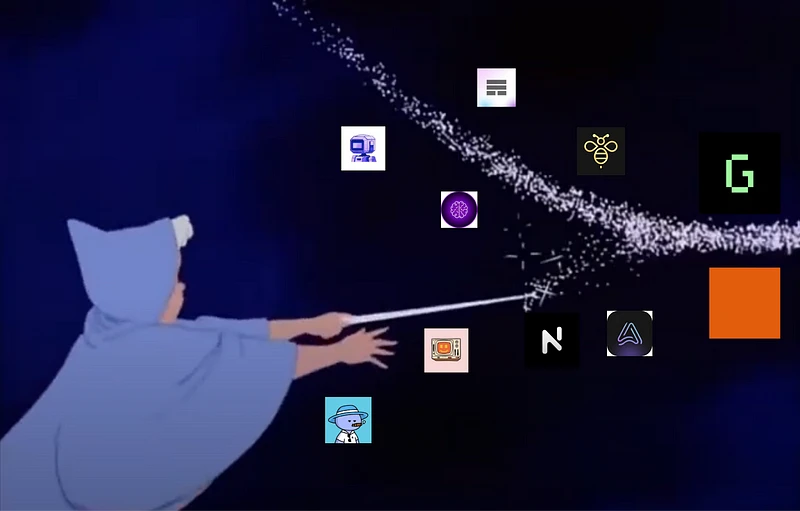Can DeFAI, which deeply integrates DeFi and AI, give birth to a new wave of AI Agents?
Orijinal yazar: YBB Capital Araştırmacısı Ac-Core

1. What story does DeFAI tell?
1.1 What is DeFAI
To put it simply, DeFAI is AI+DeFi. The market has hyped up AI over and over again, from AI computing power to AI Meme, from different technical architectures to different infrastructures. Although the overall market value of AI Agents has generally fallen recently, the concept of DeFAI is becoming a new breakthrough trend. The current DeFAI can be roughly divided into three categories: AI abstraction, autonomous DeFi agent, and market analysis and prediction. The specific divisions in the categories are shown in the figure below.

Image source: self-made by the author
1.2 How DeFAI works
In the DeFi system, the core behind AI Agent is LLM (Large Language Model), and its operation involves multi-level processes and technologies, covering all aspects from data collection to decision execution. According to the research of @ 3 sigma in the IOSG article, most models follow six specific workflows: data collection, model reasoning, decision making, hosting and operation, interoperability, and wallets. The following is a summary:
1. Data Collection: The first task for an AI Agent is to gain a comprehensive understanding of the environment in which it operates. This involves acquiring real-time data from multiple sources:
-
On-chain data: Obtain real-time blockchain data such as transaction records, smart contract status, and network activities through indexers, oracles, etc. This helps Agents keep in sync with market dynamics;
-
Off-chain data: Obtain price information, market news, and macroeconomic indicators from external data providers (such as CoinPazarCap, Coingecko) to ensure that the agent understands the external conditions of the market. This data is usually provided to the agent through an API interface;
-
Decentralized data source: Some agents may obtain price oracle data through a decentralized data feed protocol to ensure the decentralization and credibility of the data.
2. Model Reasoning: After data collection is completed, the AI Agent enters the reasoning and calculation phase. Here, the Agent relies on multiple AI models for complex reasoning and prediction:
-
Supervised and unsupervised learning: AI models can analyze the behavior of markets and governance forums by training on labeled or unlabeled data. For example, they can predict future market trends by analyzing historical trading data, or infer the outcome of a voting proposal by analyzing governance forum data;
-
Reinforcement learning: Through trial and error and feedback mechanisms, AI models can autonomously optimize strategies. For example, in token trading, AI agents can determine the best time to buy or sell by simulating multiple trading strategies. This learning method enables agents to continuously improve under changing market conditions;
-
Natural Language Processing (NLP): By understanding and processing user natural language input, Agents can extract key information from governance proposals or market discussions to help users make better decisions. This is especially important when scanning decentralized governance forums or processing user instructions.
3. Decision making: Based on the collected data and the results of reasoning, the AI Agent enters the decision-making stage. In this stage, the Agent not only needs to analyze the current market situation, but also make trade-offs between multiple variables:
-
Optimization Engine: Agents use optimization engines to find the best execution plan under various conditions. For example, when performing liquidity provision or arbitrage strategies, Agents must consider factors such as slippage, transaction fees, network latency, and fund size in order to find the optimal execution path;
-
Multi-agent system collaboration: In order to cope with complex market conditions, a single agent sometimes cannot fully optimize all decisions. In this case, multiple AI agents can be deployed, each focusing on different task areas, to improve the decision-making efficiency of the overall system through collaboration. For example, one agent focuses on market analysis, and another agent focuses on executing trading strategies.
4. Hosting and operation: Since AI Agent needs to process a lot of calculations, it is usually necessary to host its model on an off-chain server or distributed computing network:
-
Centralized hosting: Some AI agents may rely on centralized cloud computing services such as AWS to host their computing and storage needs. This approach helps ensure the efficient operation of the model, but it also brings potential risks of centralization;
-
Decentralized hosting: To reduce the risk of centralization, some agents use decentralized distributed computing networks (such as Akash) and distributed storage solutions (such as Arweave) to host models and data. Such solutions ensure the decentralized operation of the model while providing persistence of data storage;
-
On-chain interaction: Although the model itself is hosted off-chain, the AI Agent needs to interact with the on-chain protocol in order to perform smart contract functions (such as transaction execution, liquidity management) and manage assets. This requires secure key management and transaction signing mechanisms such as MPC (multi-party computation) wallets or smart contract wallets.
5. Interoperability: The key role of AI Agent in the DeFi ecosystem is to interact seamlessly with multiple different DeFi protocols and platforms:
-
API integration: Agents exchange data and interact with various decentralized exchanges, liquidity pools, and lending protocols through API bridges. This allows Agents to access key information such as market prices, counterparties, lending rates, etc. in real time and make trading decisions accordingly;
-
Decentralized messaging: To ensure the synchronization of the Agent with the on-chain protocol, the Agent can receive updates through decentralized messaging protocols such as IPFS or Webhook. This allows the AI Agent to process external events in real time, such as voting results of governance proposals and changes in liquidity pools, and adjust strategies accordingly.
6. Wallet management: AI Agent must be able to perform actual operations on the blockchain, which all depends on its wallet and key management mechanism:
-
MPC wallet: Multi-party computation wallets split private keys among multiple participants, allowing agents to conduct transactions securely without a single point of key risk. For example, Coinbase Replit’s wallet demonstrates how to use MPC to achieve secure key management, which allows users to delegate some autonomous operations to AI agents while maintaining a certain level of control;
-
TEE (Trusted Execution Environment): Another common way to manage keys is to use TEE technology to store private keys in a protected hardware enclave. This approach enables AI Agents to conduct transactions and make decisions in a completely autonomous environment without relying on third-party intervention. However, TEE currently faces problems with hardware centralization and performance overhead, but once these problems are solved, fully autonomous AI systems will become possible.
1.3 The Origin of the Sect? From Intention to DeFAI

Image source: self-made by the author
If DeFAI’s vision is to enable users to manage their portfolios autonomously through AI agents and various AI platforms, making it easy for everyone to participate in kripto market transactions, does this vision naturally remind us of the concept of “intention”?
Lets review the concept of intent first proposed by Paradigm. When we trade normally, we need to specify a clear execution path, just like exchanging Jeton A for Token B on Uniswap, but in the intent-driven scenario, the execution path is matched and finally determined by the solver and AI. In other words: transaction = I specify the execution method of TX; intent = I only want the TX result but dont care about the execution process. From the rearview mirror perspective, DeFAIs narrative is not only close to the ultimate concept of AI Agent, but also perfectly catches up with the vision of realizing intent while fitting AI. Overall, DeFAI is more like a newly added path for intent.
The ultimate version of realizing large-scale application of blockchain in the future will be: AI Agent + Solver + Intent – Centric + DeFAI = Future?
2. DeFAI related projects

Image source: self-made by the author
2.1 Griffain
@griffaindotcom $GRIFFAIN: is an innovative platform that combines AI Agents with blockchain, which helps users to issue AI Agents, focusing on creating a powerful and scalable decentralized finance (DeFi) solution that supports seamless token swaps, liquidity provision, and ecosystem growth. It can easily manage wallets, transactions, and NFTs, and automatically perform tasks such as Memecoin issuance and airdrops.
2.2 Hey Anon
@HeyAnonai $ANON: is an AI-driven DeFi protocol that simplifies interactions, aggregates real-time project data, performs complex operations through natural language processing, and facilitates the users DeFi abstraction layer. DWF Labs announced support for the DeFAI project Hey Anon through its AI Agent Fund and launched Moonshot on January 14.
2.3 Orbit
@orbitcryptoai $GRIFT: Simplifies the complex DeFi interface and operations, lowering the threshold for ordinary people to participate.
Currently, it supports more than 100 blockchains and more than 200 protocols (EVM and Solana), and the token GRIFT is used to inject vitality into the platform.
2.4 Neur
@neur_sh $NEUR: is an open source full-stack application that brings together LLM models and blockchain technology capabilities, designed specifically for the Solana ecosystem, using the Solana Agent Kit for seamless protocol interactions.
2.5 Modenetwork
@modenetwork $MODE: It positions itself as the central platform for AI x DeFi innovation on Ethereum Layer 2. Holders can stake MODE to obtain veMODE, thereby enjoying the airdrop of AI agents, and is committed to becoming the DeFAI Stack.
2.6 The Hive
@askthehive_ai $BUZZ: Built on Solana, it integrates multiple models including OpenAI, Anthropic, XAI, Gemini, etc. to enable complex DeFi operations such as trading, staking, and lending.
2.7 Bankr
@bankrbot $BNKR: is an AI-driven cryptocurrency companion that allows users to easily buy, sell, exchange, place limit orders and manage wallets by just sending a message. It also plans to add token swaps and on-chain tracking functions in the near future. The vision is to enable everyone to use DeFi and automate transactions.
2.8 HotKeySwap
@HotKeySwap $HOTKEY: Provides a complete set of DeFi tools including AI-driven DEX aggregator and analysis tools, cross-chain transactions, and supports cross-chain transactions and analysis.
2.9 Gekko AI
@Gekko_Agent $GEKKO: An AI agent created by Virtuals Protocol, focused on providing comprehensive automated trading solutions, an AI agent specifically made for prediction markets. Automated trading strategies for GEKKO tokens include automatic rebalancing, yield harvesting, and the ability to create new token indices.
2.10 ASYM
@ASYM 41 b 07 $ASYM: Provides AI-driven DEX aggregator and analytics tools that identify high ROI opportunities and settle the resulting profits in $ASYM.
2.11 Wayfinder Foundation
@AIWayfinder $Wayfinder: An AI full-chain interactive tool launched by the card game chain Parallel to help Agents navigate in the on-chain environment, perform transactions and interact with decentralized applications.
2.12 Slate
@slate_ceo $Slate: It is a general-purpose AI agent and agent connection infrastructure layer that uses natural language commands and translates them into on-chain operations, focusing on the execution of automated trading strategies, buying or selling under specific conditions, making on-chain operations as simple as thinking.
2.13 Cod 3x
@Cod 3 xOrg $Cod 3 x: Solana AI hackathon project, providing code-free development tools to build agents that can automate DeFi strategies. Its Agentic Interface is a tool that can perform complex operations using only intent expressions.
2.14 Almanak
@Almanak__ $Almanak: A self-learning, autonomous AI agent that uses agent-based modeling to optimize DeFi and gaming projects. Its mission is to leverage data science and trading knowledge to maximize the profitability of protocols while ensuring their economic security.
2.15 HIERO
@HieroHQ $HTERM: A multi-chain smart tool for Solana and Base networks that allows users to use natural language commands to autonomously complete transactions, including buying and selling tokens, performing simple token analysis, etc.
3. What kind of system will the AI Agent end up in?

Image source: self-made by the author
Every moment counts, and DeFAI projects are springing up like mushrooms after rain. After Bitcoin fell sharply to below $90,000 on January 13, the next day, according to CoinGecko data, DeFAI-related tokens rose by 38.73%, with $GRIFT, $BUZZ, and $ANON seeing the largest increases. However, it is worth thinking about how AI Agent should move in the financial direction, as the current crossroads point to Game on the left and DeFi on the right.
3.1 Game to the left
M 3 (Metaverse Makers _) (@m 3 org) may be the most promising representative. The project is composed of artists and open source hacker communities suspected to be the organization behind ai16z. The core members of the team include JIN (@dankvr), Reneil (@renei l1 337), Saori (@saori_xbt), Shaw (@shawmakesmagic), etc. However, the biggest practical obstacle for Game is that in the Web2 market, which is rich in manpower and resources, there has never been a truly popular AI game. The highly anticipated Phantom Beast Palu in January 2024 caused controversy about whether to adopt AI design because of its development efficiency far exceeding that of ordinary people, but the CEO eventually denied this statement. In addition, the long development cycle required by the game itself, compared with DeFI to the right, AI Game seems to need more market enthusiasm.
3.2 DeFi to the Right
The project market capitalization ranks $GRIFFAIN, $ANON, $OLAS, $GRIFT, $SPEC, $BUZZ, $RSS3, $SNAI, and $GATSBY, among which the combined market capitalization of GRIFFAIN and ANON accounts for 37.29% of DeFAIs total market capitalization.
GRIFFAIN: Built on Solana, it currently ranks first in the DeFAI market cap rankings with a market cap advantage of $457M and 103,000 followers on Twitter. Its core function is to complete pointed transactions and fast transactions by generating wallets. Currently, it can cost 0.01 Sol to complete the NFT casting of The Agent Engine.
Hey Anon: It adopts a multi-training mode and currently supports different public chains such as Sonic Insider, Solana, EVM, opBNB, etc. The sudden sprint of $ANON is entirely driven by the halo of its founder Daniele (@danielesesta), who is also the founder of Wonderland, Abracadabra and WAGMI. The traffic alone has injected a lot of vitality into $ANON. Hey Anon, as his next entrepreneurial project, is currently ranked second with a market value of $248 M.
IV. Summary
The emergence of DeFAI is not accidental. The core feature of blockchain is to adapt to strong financial scenarios. Currently, both GameFAI and DeFAI have shown comparable market potential. In the left direction of Game, there may be a continuation of the inheritance metaverse in the future. With the help of AI, virtual property, roles, economy and other aspects can be managed. The AI Agents reproduction of Meme elements can be used to achieve the autonomy and prosperity of the self-evolving metaverse.
DeFi will inevitably move from passionate emotional speculation to an end point oriented towards actual value. The value of AI Agent cannot rely on issuing Meme to cater to market trends, but the continuation of the AI Agent story must be supported by DeFi-like income nesting dolls. The victorious king will not always wear armor, and the final result of market competition is worth looking forward to.
This article is sourced from the internet: Can DeFAI, which deeply integrates DeFi and AI, give birth to a new wave of AI Agents?
Headlines Cboe submits 4 Solana spot ETF listing applications to the US SEC James Seyffart, senior ETF analyst at Bloomberg, wrote on the X platform, “Cboe has just submitted applications to the US SEC for four Solana spot ETFs, the issuers are VanEck, 21Shares , Canary Capital and Bitwise. If the SEC does not reject the above-mentioned application, the final deadline is around early August next year.” Tether has issued 9 billion USDT since November 8 According to Lookonchain monitoring, Tether has issued a total of 9 billion USDT since November 8. BTC breaks through 98,500 USDT in a short period of time, setting a new record high OKX market data showed that BTC rose in the short term and briefly broke through 98,500 USDT, with a 24-hour increase of…







